Bundestag
![]()
This article is about the Bundestag of the Federal Republic of Germany; for the building with the seat of the Bundestag see Reichstag building. For other articles cf. Bundestag (disambiguation)
The German Bundestag (abbreviation BT) is the parliament and thus the legislative body of the Federal Republic of Germany with its seat in Berlin. The Bundestag is elected in the political system of Germany as the only constitutional body of the Federation directly by the people, the German citizens, according to Article 20 para 2 sentence 2 GG in conjunction with Article 38 GG.
The statutory number of its members representing the whole people is 598 according to § 1 para 1 sentence 1 BWahlG. The actual number of members may be higher due to overhang and compensatory mandates. In the 19th German Bundestag there is a record number of 709 mandates, making the Bundestag the largest freely elected national unicameral parliament in the world.
A legislative period of the Bundestag generally lasts four years. The members of the German Bundestag (MdB) can join together to form parliamentary groups or factions and thus enjoy a special procedural and organisational status. The Bundestag is presided over by the President of the German Bundestag (short: Bundestag President), who also holds the office of President of the Federal Assembly. The current President of the Bundestag is Wolfgang Schäuble (CDU).
In accordance with the Rules of Procedure, the oldest member of the Bundestag, Hermann Otto Solms (FDP) since 2017, chairs the first session of the German Bundestag at the beginning of a new legislative period.
The Bundestag has a variety of tasks: It has the legislative function, that is, it creates federal law and amends the Basic Law, the Constitution. This often requires the participation of the Bundesrat, an independent constitutional body that has tasks comparable to those of a Second Chamber of Parliament (internationally usually classified as the upper house). The Bundestag approves treaties with other states and organizations (international treaties) and adopts the federal budget. As part of its creative function, it elects, among other things, the head of government (Federal Chancellor) by an absolute majority and participates in the election of the head of state (Federal President), federal judges and other important federal bodies. The Bundestag exercises parliamentary control over the Government and the executive branch of the Federation; it also controls the deployment of the Bundeswehr. Politically significant is the public function, according to which the Bundestag has the task of expressing the wishes of the people and, conversely, to inform them.
The German Bundestag has been based in the Reichstag building in Berlin's Mitte district since 1999. In addition, it maintains a number of other functional buildings to support parliamentary work. (see below) The Reichstag building is protected by the police at the German Bundestag, which reports to the President of the Bundestag.
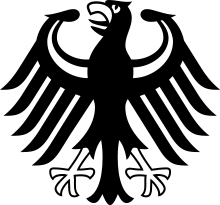
Seal of the German Bundestag as a permanent constitutional body
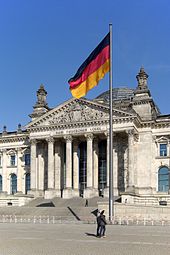
Flag of Unity in front of the seat of the German Bundestag in the Reichstag building in Berlin, hoisted as a memorial on 3 October 1990
.jpg)
Chancellor Angela Merkel during a debate in the plenary hall of the German Bundestag, the federal government's bench on the left, 2014
Plenary
The Plenary Hall, where both the German Bundestag and the Federal Assembly meet, is the largest assembly hall in the Reichstag building.
In the middle of the front side there is the session board with the President of the Bundestag or his representative and two secretaries, behind them the director at the German Bundestag and the employees of the plenary assistance service. The seat of the Commissioner for the Armed Forces and the Bundesrat bench are on the left-hand side of the front of the Chamber, and the Government bench is on the right-hand side. The seat nearest to the Presidium in each case is reserved for the Federal Chancellor and the President of the Bundesrat.
Behind the desk of the Presidium are the federal and the European flag under the large, 2.5-ton Bundestag eagle (the "fat hen"). The federal flag is a replica of the main flag of the Hambach Festival of 1832, which demonstrated the demands for unity and freedom during the so-called Vormärz, with the third stripe made of gold lurex. It was presented to the German Bundestag in 1949 by the government of the state of North Rhine-Westphalia on the occasion of the first session of Parliament in Bonn and renewed in 1999 during the parliamentary summer recess. The centre of the plenary chamber is the speaker's rostrum. In front of the speaker sit the stenographers and the members of the Bundestag.
The President sees the plenum in front of him. On his right, in a semicircle, sit the members of the AfD. Next to them sit the members of the FDP and then in the middle the CDU/CSU. In the left-centre sits the parliamentary group of Bündnis 90/Die Grünen, and in the left half of the plenum the SPD parliamentary group has its place. Although the Greens were considered more "left-wing" than the SPD in their early days, the SPD insisted in 1983 that no parliamentary group should sit to its left. This division remained in place until reunification. Since then the MPs of the party Die Linke sit on the far left, because when the then PDS moved in in 1990 the SPD did not insist on their outer place. Above the deputies sit visitors of the Bundestag on own tribunes. They are not allowed to express approval or disapproval; they can be expelled from the hall in case of violation.
Behind the benches of the Federal Government and the Bundesrat are boards with illuminated letters indicating the current item on the agenda. Likewise, a green "F" signals when television is broadcasting. The chairs in the German Bundestag are permanently installed after a Bundestag election according to parliamentary groups. The plenary hall is additionally illuminated by a mirror system which redirects daylight from the dome into the hall.
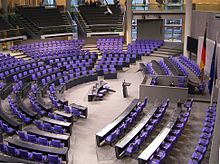
Plenary hall of the German Bundestag
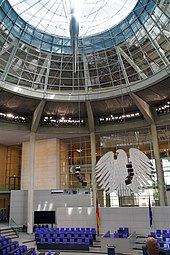
"Fat Hen" with Reichstag dome
Mandate
→ Main article: Bundestag electoral law
According to the electoral law principles of personalised proportional representation, representatives of the people are elected in general, direct, free, equal and secret elections in 299 constituencies. Through the election they receive a so-called mandate, the political representation mandate, which the electorate gives to the member of the legislative body. The mandate holders are called deputies. The voter casts two votes: With his first vote (on the left, see diagram) in the German Bundestag election, one votes for a direct candidate in his constituency (also constituency vote). The candidate enters the parliament directly, as soon as he has reached the relative majority of the votes. The so-called second vote is cast with a cross on the right side of the official ballot paper. A similar electoral system is found in some state elections.
The legal number of members of the Bundestag amounts to 598 since the beginning of the 15th legislative period. For the distribution of the seats the second vote result is decisive. In the distribution, first those MPs are taken into account who have won the mandate in their constituency directly on the basis of the first vote result - one speaks also of direct mandate. The remaining seats are then allocated to candidates on the previously determined state lists of the parties. Here, a party with its state lists is only considered if it has received at least five percent of the second votes cast or at least three direct mandates.
There are three typical distribution cases:
- A party has won a larger share of strength than the number of direct mandates. Further mandates are then allocated to it according to the national list.
- A party has won a smaller share of strength in a Land than the number of direct mandates. All of these surplus direct mandates are valid, the so elected deputies enter the parliament regardless of the distribution of seats in terms of strength. The total number of the delegates increases thus by these mandates, colloquially overhang mandates, and increases thereby the legal number in accordance with § 1 BWahlG. Other parties then usually receive additional compensatory mandates.
- A party has won a share of strength that corresponds exactly to the number of direct mandates. No further mandates are then allocated.
The system of personalised proportional representation enables the voter to vote for his or her preferred political party on the one hand, and on the other hand to elect a candidate for a Member of Parliament from his or her constituency independently of this party. The Bundestag itself takes over the election examination according to Article 41 GG, it also decides whether a deputy has lost his mandate. Against the decision of the Bundestag an election review complaint can be lodged with the Federal Constitutional Court. The Bundestag meets at the latest on the thirtieth day after the election (Article 39 (2) GG).
Due to a decision of the Federal Constitutional Court, the German Bundestag was obliged to change the electoral law before the 2013 Bundestag elections, as the previous practice of distributing overhang mandates, which could result in a negative weighting of votes, was not compatible with the Basic Law in the opinion of the court. On 21 February 2013, the Bundestag finally passed a new electoral law with the votes of the CDU/CSU, SPD, FDP and Bündnis 90/Die Grünen parliamentary groups. The left-wing parliamentary group voted against. The amended electoral law provides that all overhang mandates that arise in an election are to be compensated. Thus, the size ratio of the parties according to the result of the second votes is to be preserved. However, this could lead to a considerable enlargement of the Bundestag.
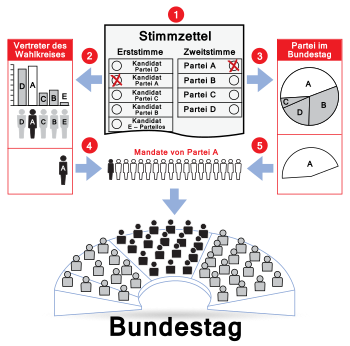
Proportional representation in the election to the German Bundestag
Search within the encyclopedia